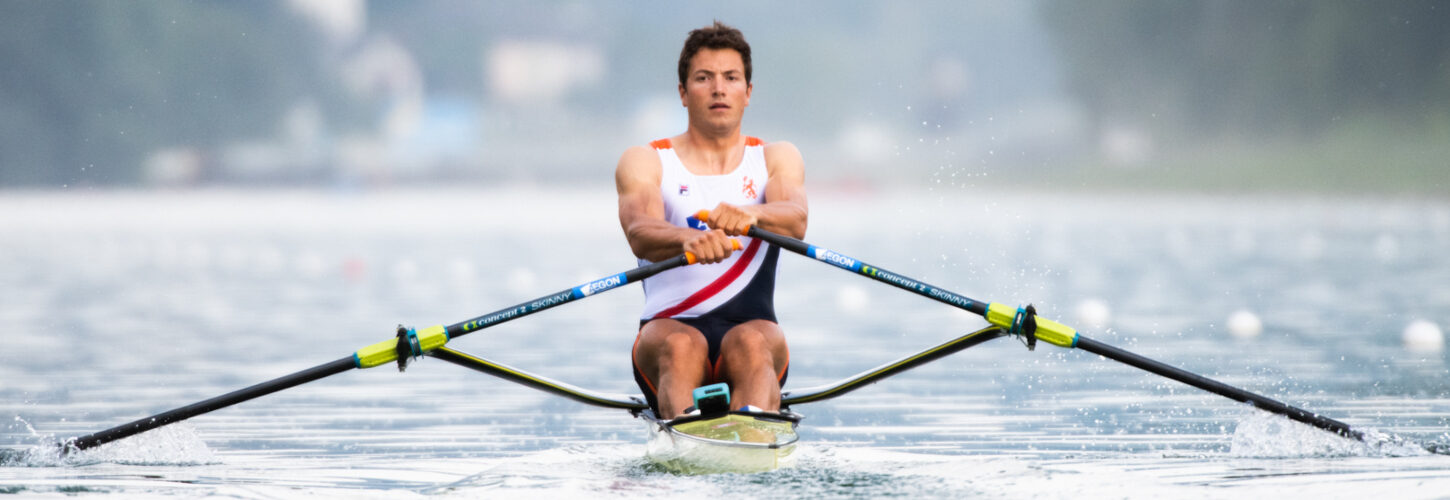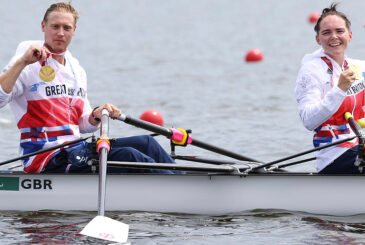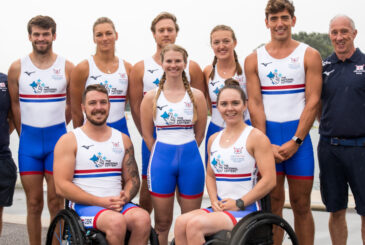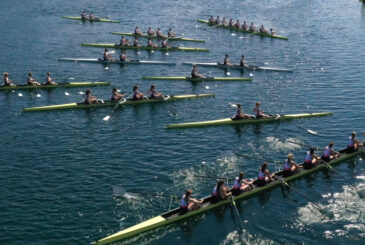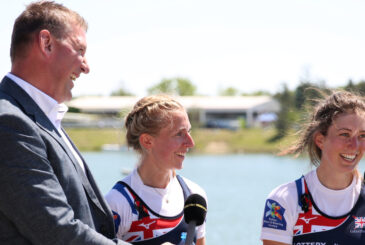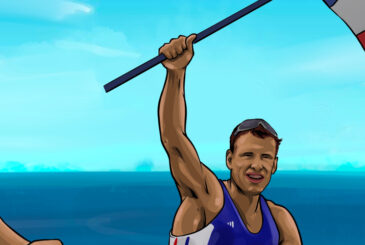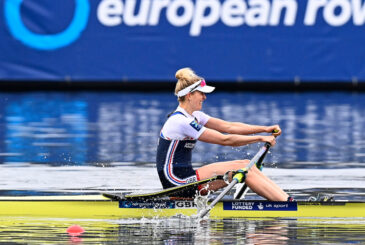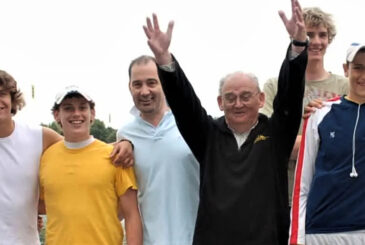European silver medallist Stef Broenink set the single sculls’ finals alight in 2019. Martin Cross finds out more
Chances are you’d love to spend some time talking to Stef Broenink about rowing.
For a powerhouse like him – he’s 1.94 tall and weighs in at 105 kilos – he’s a surprisingly reflective and gently spoken man.
The 29-year-old biochemical engineering student likes to do his thinking out loud and we had a great conversation. But, he admitted that the introvert within him tends to find too much company exhausting. Then he needs a space of his own to recharge.
On the water in 2019 he was in sensational form: a key player in two of the most exciting singles races you’ll ever see – the 2019 Worlds’ final and, earlier, the final of the Europeans on the Rotsee in Lucerne.
His catches were way too aggressive and his balance in rough water was sometimes
non-existent
In both races, Stef’s incredible power – he’s pulled 5:33 on the RP3 erg for 2k – saw him blast out from the middle of the field to lead the race going into the third quarter ahead of the likes of Ollie Zeidler, Kjetil Borch, Sverri Nielsen and the rest.
It was a tactic that blew the race apart and, in both cases, set up a nail-biting sprint for the line.
In Linz, Stef’s charge saw him finish just a second off the gold medal. But the pace been so intense from the other athletes, Stef’s effort ‘only’ secured him a frustrating fifth place. In the Europeans, it was a different story. He was just 0.2 seconds off Zeidler’s finish time – good enough for European silver.
You’d think that sort of form would see Stef salivating at the prospect of challenging for the Olympic singles gold in Tokyo next year. But that’s not the current thinking of the hugely impressive team – Eelco Meenhorst, Diederik Simon and Jabik-Jan Bastiaans – who run Dutch sculling.
Right now, the team that saw the Dutch quadruple scull post a comprehensive triumph at the 2019 Worlds, see the men’s double – with the 23-year-old Melvin Twellaar – as the best vehicle for Stef’s unique boat-moving skills in Tokyo.
For context, Stef was a late developer in the sport coming into it only at the age of 21 at the student KSRV Njord club in Leiden. A rough and ready strongman, in the gym Stefan could out-pull almost anyone on the erg, but on the water it was a different story. His catches were way too aggressive, his blades dug too deep and his balance in rough water was sometimes non-existent.
As the 2019 season has shown, he’s been smoothing off those rough edges year by year.
A few days later I pulled 6:07. Then I was on the floor!
But over to Stef…
Martin: So, how did you get into rowing?
Stef: When I was coming up to 18, I moved to Leiden to study and I got into the water polo team. That was way too intense for me and I quit after a couple of months.
In the second year I picked up rugby, which, to be frank, was more about the drinking than the rugby. By the time I was 20, I signed up with my rugby committee to do this 100k rowing race in big boats, organised by Laga Delft. We didn’t do too much training, but I really liked the rhythm. So, I stuck around and aimed for the freshman eight at Njord for the next season.
Were you good on the erg back then?
That summer you had to do a 2k test on the Concept2. I had no idea what I should do, but a coach told me to pull 1:40s and that would be a good score. So, I started out with that and at halfway I thought I could go harder and I went down to 1:30s.
At the end there were all these people lying on the ground and I felt fine – I pulled a 6:27. But, I clearly hadn’t given it enough. So, I said I could do better, and the coaches said: ‘We’d like to see you do that’.
A few days later I pulled 6:07. Then I was on the floor!
At the end of my first year of rowing I was pulling 5:53 and, two years later, that went down to 5:47. Now, we do all our erging on the RP3. It takes some getting used to, but it feels much more sympathetic to the rowing stroke.
I had a great race in the heat at Varese and the Dutch press were like, ‘here’s a great new talent’
So, I guess those times got you noticed?
The guys at the federation saw those times and there weren’t too many people who could pull those kinds of scores at that time.
After my freshman year, Lili [Meeuwisse], our coach had this team of people that were going to the federation. She decided I needed to learn to row the single. I flipped the boat a lot of times, but because of my water polo, I had no fear of the water – I just went for it. That was a really tough year.
The next season [2014] I was actually rowing in the Dutch eight at the Sydney World Cup. I got ditched when Kaj Hendriks came back…
I guess, from then on, I was a bit of a rebel. For a relative novice I didn’t feel like I was getting a lot of coaching, so I decided to go back to Njord, get coached by Lili and row in a double with Ruben [Knab].
But you missed a trip to the Rio Games…
The double wasn’t fast enough and so in 2016 I was in a single. I had a great race in the heat at Varese and the Dutch press were like, ‘here’s a great new talent’. Then conditions were rough in the semi and I came in last.
At the Lucerne Regatta I made the A final and just missed out on a medal to Angel [Fournier Rodriguez].
To be honest, we didn’t even think that it would have been an option for us to have competed in the Olympic qualification regatta a couple of weeks earler. My form in the single was a bit hit and miss. Flip a coin and it was heads I’d have a row like at Lucerne. But it could be tails – and I could flip the boat or sink.
That was a bit of a low point for me and I wondered about quitting the sport
So, when did your real learning start?
In 2017, I felt I had to be the fastest single and I tried to win every session. There were a lot of young, fast guys coming in and it was hard.
I was hyper-competitive – I came back too soon after my back injury and finished fourth at the nationals. Then in 2018 when Jabik came in with the programme he helped me realise I had to go less hard in the steady state session. That meant I could work more on my technique.
After a while, my heart rate decreased, but my boat speed went up. Now I’m getting a good connection at the front and understand how to release the boat without using too much back. That saw me move into the Dutch quad in 2018, which is a pretty scary boat because it moves so fast. We finished fifth in that crew [at the Worlds] and in the months after that result, I lost my place in the quad.
That was a bit of a low point for me and I wondered about quitting the sport and spending more time on my studies. But then Martina, my long-term partner, persuaded me to just hold out a bit longer and then about four weeks later I had a European silver medal.
So, what have you learnt from rowing?
When I arrived at university, I didn’t want to study hard and didn’t want to take sport too seriously. But when I began to row more seriously, I found that really helped with my studies and I became a lot more driven in my studies.
When I finished third in an exam recently, I was like ‘why are those other two better than me?’.
The sport has taught me that if I invest enough energy into something then I can do it. I’ve found my rhythm and I’m a happy man now.
Photo: Merijn Soeters


